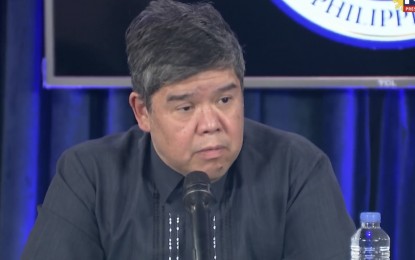
Department of Foreign Affairs Undersecretary Eduardo Jose de Vega (PNA file photo)
MANILA – Diaspora, or the spreading of Filipinos across the globe along with the Filipino culture, is the country's “soft power”, an official of the Department of Foreign Affairs (DFA) said Monday.
In diplomacy, soft power is the ability of a nation to influence other nations through attraction and persuasion instead of force or intimidation.
"We send our people or they themselves go without government intervention or support. We deploy our workers, beginning 1973 in the oil crisis, caused by the conflict between Israel and their cousin, the Arabs but not just as workers," DFA Undersecretary Eduardo Jose de Vega said during his speech at a multi-stakeholder symposium.
He said these Filipinos sent abroad are instruments of the country's foreign policy.
"Oftentimes, especially after Republic Act 8042, our diaspora drives our foreign policy," he added.
According to DFA's latest report to Congress, there are 10,854,592 Filipinos abroad. The Americas host 49.04 percent of the tally; the Asia-Pacific, 22.83 percent; the Middle East, 21.88 percent; Europe 6.03 percent and Africa, 1 percent.
Filipinos experience disasters, calamities, famine, war and pandemic happening in their host countries.
While the Department of Migrant Workers (DMW) ensure the welfare of Filipinos abroad, the DFA sees their potential to be leaders -- their capability to be rescuers instead of being only rescuees.
Hence, the establishment of the Filipinas Ultramar (the Philippines abroad) concept. The vision of this concept has been forwarded to all Foreign Service Posts (FSPs) via circulars.
Under this move, each of the FSPs must submit a master list of Filipino community organizations and contact persons in all countries under their jurisdiction to create an international list of Filipino organizations worldwide.
Each country falling within an FSP's jurisdiction must have a national coordinating umbrella organization or Council of Filipino Community organizations. The chair of these organizations would be a member of a national council.
In the spirit of Republic Act (RA) 9148 or the Volunteer Act of 2007, volunteers must be trained as soon as umbrella worldwide councils are catalogued and documented.
They would be trained to conduct rescue and rehabilitation work in their respective countries and become accredited by the state-sanctioned volunteer and relief/rescue organizations of their host countries.
"We hope to encourage and train Filipinos into giving back to their host communities, including possibly contributing as volunteers during local calamities, disasters, and other crises," de Vega said.
"In such manner, our diaspora becomes not only a group of Filipinos who seek employment abroad, but more than that: they are a great gift of the Filipino nation to all peoples on earth, and our contribution to world peace and harmony," he added.
To establish a framework of the RA 9148 implementation abroad, de Vega said the DFA could work with the Commission on Filipinos Overseas, the DMW, Department of Trade and Industry, the Department of National Defense, the Armed Forces of the Philippines, the Philippine National Police, and the Philippine National Volunteer Service Coordinating Agency. (PNA)
